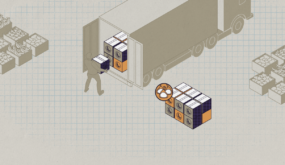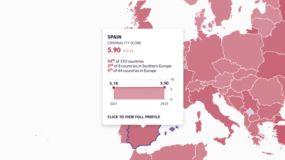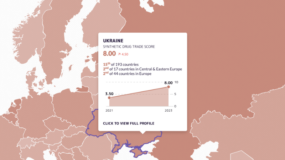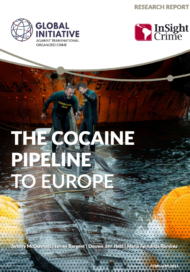On 14 May 2024, four hooded gunmen rammed a prison van with two vehicles and then opened fire, killing two guards and wounding several others. Their objective was to free Mohamed Amra, a French criminal who was being transported from a court hearing in Rouen to a secure facility in Évreux.
After releasing Amra, the criminals fled in two cars, which were later found burnt. The attack sparked a massive manhunt in France, with INTERPOL issuing a Red Notice on 15 May. The operation reflects the rapidly evolving nature of organized crime in France.
Amra is a lifelong criminal, with a record dating back to the age of 15. At the time of his escape, he was being held on charges of aggravated robbery and suspected involvement in a murder in Marseilles, but his criminal portfolio is reportedly much broader. He came to the attention of the French anti-narcotics agency (Office anti-stupéfiants, OFAST) for alleged cocaine trafficking between the French West Indies and mainland France, and was implicated in a drug-related murder near Marseilles in June 2022 despite being in prison at the time. While in prison, he continued to run his business through the messaging app Signal and attempted to obtain assault rifles. He is also said to have had links with the Marseilles drug gang ‘Blacks’.
While the motives behind the Normandy attack – besides freeing Amra – are not yet fully known, it is clear that it was a well-planned and coordinated operation. It was also not without considerable risk, given the predictable response from the French authorities, but it seems that the criminal calculus dictated that Amra was worth it. Although he is not a kingpin, Amra appears to be a node in the country’s notorious criminal networks, with considerable influence over them.
Organized crime on the rise in France
Amra’s diverse career touches on many of the changes that France has witnessed in its organized crime landscape in recent years, dominated by foreign organized crime actors. These rising threats include the spread of criminal market-related violence, the growing number of crimes across a range of cities and a booming illicit drugs market, particularly for cocaine, which is among the largest in Europe. France consistently ranks first among the Western European countries in terms of levels of criminality, according to the Global Organized Crime Index. The number of drug-related murders and attempted murders rose by 38 per cent between 2022 and 2023. The port city of Marseilles – long a gateway for drugs entering France – has become a hotspot of violence: it has witnessed more than 300 drug-related killings in the last decade, with a 50 per cent increase between 2022 and 2023 alone.
The illicit drugs market, both wholesale and retail, is highly diversified, with both French and foreign organized crime groups active and competing within it. In recent years, the influence of drug trafficking has spread beyond the main hubs of Marseilles and Paris to medium-sized towns and rural areas. Other ports are becoming increasingly prominent as entry points, including the Channel port of Le Havre. In March 2024, 2.7 tonnes of cocaine were found in a container at the port, originating from Guadeloupe, a French overseas region in the Caribbean. Across the country as a whole, there has been a fivefold increase in cocaine seizures since 2012, with a record 27.7 tonnes seized in 2022. Smaller fishing ports and marinas have also been pressed into service and, as the industry grows, it draws more and more people into its fold – typically jobbeurs, young people who sign up after seeing recruitment campaigns on social networks. Today, it is estimated that 60 per cent of victims and perpetrators of narchomicides (a term coined to describe drug-related homicides) are between the ages of 14 and 21.
State responses
France has made tackling terrorism a priority for decades. However, until recently, members of the judiciary involved in the response to organized crime found the government unwilling to meet most of their demands for a more active approach to these issues. As organized crime-related murders have risen, there have been major crackdown operations in crime hotspots in recent years – notably Opération Place Nette XXL in Lille in March 2024 – but these have been dismissed by communities as stunts that merely shift the problem to the surrounding areas.
Given the current landscape, French authorities now recognize the need for a more strategic approach. Around the same time that Amra was set loose, the senate published a report examining the causes and consequences of drug trafficking in France, which it estimated to be worth between €4 and €6 billion. Testifying before the senate, a seasoned criminal declared that the underworld has now become much more violent than was the case a few decades ago, with no codes or rules – 16-year-olds were now committing murder instead of petty crime, he said.
Although the senate’s reports and recommendations are not legally binding in France, they are of value to legislators and policymakers, and can – to some extent – shape public opinion and pressure the government to act on specific issues. Acknowledging the shortcomings of the current anti-drugs strategy, the senate sounded the alarm about where things are headed: ‘We are not in a narco-state,’ said one senator, ‘but we are approaching a weakening of public power, and that is a sign of a narco-state.’
To address this state of affairs, the report recommended, among other measures, transforming the OFAST into a French drug enforcement administration (following the US model) and creating a national anti-narcotics prosecutor’s office to process high-level drug trafficking cases. Increasing the confiscation of criminal funds and assets, and tackling corruption were also cited as essential. The senate also advised improvements to the overcrowded prison system, which is considered a hotspot for drug trafficking and a space where criminals can access to their networks, as was the case with Amra.
The issue of a booming drug trafficking market is not confined to France. Belgium and the Netherlands have also seen dramatic increases in criminal violence linked to the cocaine trade, making international cooperation essential. Germany has also become the focus of international drug trafficking networks, with an unprecedented spike in cocaine seizures over the past five years. As the French criminal who testified for the senate warned, ‘If there is no coordination in Europe, expect a difficult tomorrow.’
As the French authorities try to apprehend Amra, the state is making efforts to catch up with the surge in organized crime. Getting ahead of the curve will be a steep challenge, but one that France seems to have recognized and is now taking steps towards.
Subscribe to the GI-TOC Observatory of Organized Crime in Europe mailing list to stay updated on our upcoming publications and initiatives.
Cavale organisée
Un prisonnier s’évade en Normandie dans un contexte de montée de la criminalité organisée en France.
Le 14 mai 2024, quatre hommes cagoulés et armés foncent sur un fourgon pénitentiaire avec deux véhicules et ouvrent le feu, tuant deux surveillants pénitentiaires et en blessent plusieurs autres. Leur objectif : libérer Mohamed Amra, un criminel français en cours de transfert depuis le tribunal de Rouen vers la maison d’arrêt d’Évreux. Une fois Amra libre, les criminels s’enfuient à bord de deux voitures, que l’on retrouvera plus tard incendiées. Cette attaque déclenche une vaste chasse à l’homme en France et INTERPOL publie un avis de recherche international le 15 mai. Cette opération témoigne de la nature en pleine évolution de la criminalité organisée en France.
Amra est un criminel invétéré dont le casier judiciaire remonte à l’âge de 15 ans. Au moment de son évasion, il était détenu pour vol aggravé et implication présumée dans un meurtre à Marseille, mais son passif criminel serait beaucoup plus étendu. Il a attiré l’attention de l’Office anti-stupéfiants (OFAST) pour un trafic présumé de cocaïne entre les Antilles françaises et la France métropolitaine, et a été impliqué dans un meurtre lié à la drogue près de Marseille en juin 2022, bien qu’incarcéré au moment des faits. Pendant sa détention, il continue de gérer ses affaires sur l’application de messagerie Signal et tente de se procurer des fusils d’assaut. Il aurait également entretenu des liens avec les Blacks, le gang de trafiquants de drogue marseillais.
Si les motifs de l’attaque en Normandie – outre la libération d’Amra – ne sont pas encore totalement connus, il est clair qu’il s’agissait d’une opération bien planifiée et coordonnée. Les risques étaient également considérables, compte tenu de la réaction attendue des autorités françaises, mais la logique criminelle semble avoir estimé qu’Amra en valait la peine. Sans être un gros bonnet, Amra apparaît comme un maillon essentiel des réseaux criminels notoires du pays, sur lequel il exerce une certaine influence.
La criminalité organisée progresse en France
Le parcours d’Amra, dans toute sa diversité, illustre la montée en puissance du crime organisé dans le paysage français depuis plusieurs années, caractérisé par la présence d’acteurs étrangers de la criminalité organisée. La violence liée au trafic de drogues s’est étendue sur le territoire. La propagation de la violence liée au marché criminel, l’augmentation du nombre de crimes dans plusieurs villes et l’essor du marché des drogues illicites, en particulier de la cocaïne, qui figure parmi les plus importants d’Europe, sont quelques-unes des menaces croissantes qui pèsent sur la France. Selon l’Indice mondial du crime organisé, la France se classe régulièrement au premier rang des pays d’Europe occidentale en termes de niveau de criminalité. Le nombre de meurtres et de tentatives de meurtre liés à la drogue a augmenté de 38 pour cent entre 2022 et 2023. La ville portuaire de Marseille, qui a longtemps été la porte d’entrée de la drogue en France, est devenue un haut lieu de la violence : elle a été le théâtre de plus de 300 meurtres liés à la drogue au cours de la dernière décennie, avec une augmentation de 50 pour cent rien qu’entre 2022 et 2023.
Le marché des drogues (tant pour la vente en gros qu’au détail) se caractérise par une grande diversité, avec la présence et la concurrence de groupes criminels organisés français et étrangers. Ces dernières années, l’influence du trafic de drogue s’est étendue au-delà des principales plaques tournantes de Marseille et de Paris, vers les villes moyennes et les zones rurales. D’autres ports deviennent des points d’entrée de plus en plus importants, notamment le port du Havre où 2,7 tonnes de cocaïne ont été trouvées dans un conteneur en provenance de la Guadeloupe en mars 2024. Dans l’ensemble du pays, les saisies de cocaïne ont été multipliées par cinq depuis 2012, avec un record de 27,7 tonnes saisies en 2022. Les petits ports de pêche et les marinas ont eux aussi été sollicités et, à mesure que l’industrie se développe, elle attire de plus en plus de personnes dans son giron – généralement des « jobbeurs », des jeunes recrutés sur les réseaux à l’issue de campagnes de recrutement. Aujourd’hui, on estime que 60 pour cent des victimes et des auteurs de « narchomicides » (terme utilisé pour décrire les homicides liés à la drogue) ont entre 14 et 21 ans.
Les réponses de l’État
La France a fait de la lutte contre le terrorisme une priorité depuis des décennies. Cependant, jusqu’à récemment, les membres du corps judiciaire impliqués dans la lutte contre la criminalité organisée ont constaté que le gouvernement n’était pas disposé à donner suite à la plupart de leurs demandes d’une approche plus active de ces questions. Face à l’augmentation des meurtres liés à la criminalité organisée, de grandes opérations de répression ont été menées ces dernières années dans les points chauds de la criminalité – notamment l’opération « Place nette XXL » à Lille en mars 2024 –, mais ces opérations sont critiquées dans l’opinion française qui y voit des coups d’éclat ne faisant que déplacer le problème vers les zones environnantes.
Dans ce contexte, les autorités françaises reconnaissent aujourd’hui la nécessité d’une approche plus stratégique. Le jour où Amra a été libéré, le Sénat a publié un rapport sur les causes et les conséquences du trafic de stupéfiants en France, dont le volume est estimé entre 4 et 6 milliards d’euros. Témoignant devant le Sénat, un ancien trafiquant a déclaré que la pègre est devenue beaucoup plus violente qu’il y a quelques décennies, sans codes ni règles – des jeunes de 16 ans commettent désormais des meurtres et non plus des petits délits, précise-t-il.
Bien que les rapports et les recommandations du Sénat ne soient pas juridiquement contraignants en France, ils sont utiles aux législateurs et aux décideurs politiques, et peuvent – dans une certaine mesure – façonner l’opinion publique et faire pression sur le gouvernement pour qu’il agisse sur des questions spécifiques. Reconnaissant les lacunes de la stratégie actuelle de lutte contre la drogue, le Sénat a tiré la sonnette d’alarme sur l’évolution de la situation : « On n’est pas dans un narco-État », a déclaré un sénateur, « mais on s’approche d’un affaiblissement de la puissance publique et ça, c’est le signe d’un narco-État ».
Pour s’attaquer au problème, le rapport recommande, entre autres mesures, de transformer l’OFAST en une « DEA » à la française (selon le modèle américain) et de créer un parquet national antidrogue pour traiter les affaires de trafic de drogue de haut niveau. D’autres mesures essentielles sont proposées dans le rapport de la commission d’enquête, telles que le renforcement des confiscations d’avoirs criminels et la lutte contre la corruption. Le Sénat a également recommandé d’améliorer le système pénitentiaire surpeuplé, considéré comme un point névralgique du trafic de drogue et un espace où les criminels continuent de gérer leurs réseaux, comme ce fut le cas pour Amra.
L’explosion du trafic de drogue ne se limite pas à la France. La Belgique et les Pays-Bas ont également connu une augmentation spectaculaire de la violence criminelle liée au commerce de la cocaïne, ce qui rend la coopération internationale essentielle. L’Allemagne est aussi devenue le point de mire des réseaux internationaux de trafic de drogue, avec une augmentation sans précédent des saisies de cocaïne au cours des cinq dernières années. Comme l’a prévenu l’ancien trafiquant devant la commission d’enquête du Sénat, « s’il n’y a pas de coordination en Europe, attendez-vous à des lendemains difficiles ».
Alors que les autorités françaises tentent d’appréhender Amra, l’État s’efforce de rattraper la montée en puissance de la criminalité organisée. Il est évident que le défi est de taille, mais la France semble avoir pris conscience de cet enjeu et tente maintenant d’y faire face.



